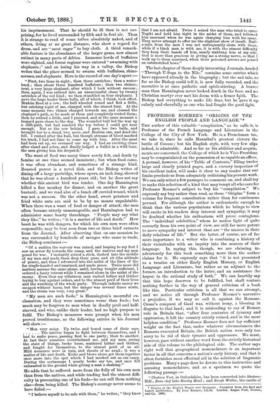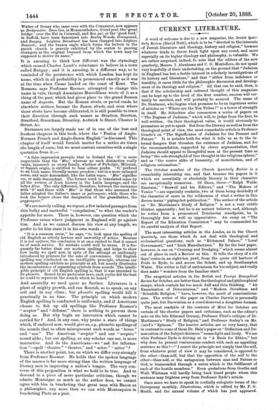PROFESSOR ROEMER'S "ORIGINS OF THE ENGLISH PEOPLE AND LANGUAGE." *
THE author of this valuable "compilation," as he calls it, its Professor of the French Language and Literature in the College of the City of New York. He is a Frenchman fe,C, we take it, since he calls Hannibal's greatest victory the battle of Cannes ; but his English style, with very few slips
indeed, is admirable. And so far as his abilities and acquire..
ments are concerned, the College of which he is Vice-President may be congratulated on the possession of so capable an officer.
A perusal, however, of his "Table of Contents," filling twelve large and closely printed pages, and a cursory inspection of his excellent index, will make it clear to any reader that our
limits preclude us from adequately criticising his present work. We can only select a few passages to comment on, and shall try to make this selection of a kind that may tempt all who care for Professor Roemer's subject to buy his "compilation." We expressly say buy rather than read, as these " Origins " form a volume for frequent consultation rather than for continuous perusal. For although the author is enthusiastic enough to think that the various populations which he brings to view will excite in his readers deep interest and sympathy, it may be doubted whether his enthusiasm will prove contagions. The "individual celebrities," whom he makes light of quite correctly from his own point of view, are still far more potent to move sympathy and interest than are "the masses in their daily relations of life." But the latter, of course, are of far more importance to a writer who is combining a history of their vicissitudes with an inquiry into the sources of their language. In saying this, though, we are claiming in- advertently for this book something more than the author claims for it. He expressly says that "it is not presented as a treatise on either Early English History, or English Language and Literature, but rather as an adjunct to the former, an introduction to the latter, and an assistance (he hopes) in the rational study of both." We can heartily say that this hope deserves to be fulfilled, but shall venture nothing further in the way of general criticism of a book like this. Particular criticism is all that we can attempt, and we notice all through Professor Roemer's narrative a prejudice, if we may so call it, against the Romans. Cresar's conquest of Gaul was, without irony, a blessing in disguise to that land; and it is misleading to say of Roman rule in Britain that, "after four centuries of tyranny and oppression, it left the country utterly ruined, and in the most helpless condition." Professor Roemer does not lay sufficient weight on the fact that, under whatever circumstances the Romans evacuated Britain, the British nation were only too sorry to be rid of their tyrants and oppressors. We must, however, pass without another word from the strictly historical side of this volume to the philological side. The author says right well that geographical nomenclature is an important factor in all that concerns a nation's early history, and that it often furnishes most effectual aid in the solution of linguistic problems. Many a page does he devote to this instructive and amusing nomenclature, and as a specimen we quote the following passage :— " Chateau Vert, in Oxfordshire, has been converted into Ethotover Hill ; Beau chef into Beachy Head ; and Burgh Waiter, the castle of • Origins of the English People and Language. Compiled from the Best and Latest Authorities. By Jean Reamer, LL.D. London: Kogan Paul. Trench, and CO. 1888.
Walter of Douay who came over with the Conqueror, now appears . as Bridgewater. Beau lieu, in Monmouthshire, Grand pont, the 'groat bridge' over the Fal in Cornwall, and Bon pd., or the 'good ford,' in Suffolk, have been Saxonised into Bewley Woods, Grampound, . and Bungay. Leighton Beauddsert has been changed into Leighton Buzzard; and the brazen eagle which forms the lectern in the parish church is gravely exhibited by the sexton to passing • strangers as the original buzzard from which the town may be supposed to derive its name."
It is amusing to think how different was the etymology
• which caused Charles Lamb's reluctance to believe in a town -called Bungay ; and it is amusing, in a different way, to be reminded of the persistence with which London has kept its name, which in all probability is pronounced exactly as it was at the time when Caesar landed on the coast of Kent. The Romans, says Professor Roemer, attempted to change this name in vain, though Ammianus Marcellinus wrote of it as a thing of,the past, which had given place to the grand Roman
name of Augusta. But the Roman strata, or paved roads, he elsewhere notices, became the Saxon streets, and even where these strata have become obliterated, it is still possible to trace
their direction through such names as Stratton, Strett,on, Stratford, Streatham, Streatley, Ardvrick le Street, Chester le Street, &c.
Surnames are largely made use of in one of the best and .freshest chapters in this book, where the "Fusion of Anglo- Norman French and Anglo-Saxon English" is discussed. This chapter of itself would furnish matter for a notice six times the length of ours ; but we must content ourselves with a single quotation from it :— i "A false impression prevails that in Ireland the ' 0 ' is more respectable than the 'Mac,' whereas no such distinction really ' exists, inasmuch as every family, whether of Firbolgic, Milesian, / or Danish origin, is entitled to bear either prefix. '0,' prefixed ' to an Irish name, literally means grandson; but in a more enlarged .sense, any male descendant, like the Latin napes. ' Mac ' signifies son, or male descendant. The former word is translated nepos by all the writers of Irish history in the Latin language, and the latter pins. The only difference, therefore, between the surnames with '0' and those with 'Mac' is that those who assumed the latter adopted the father's name or patronymic, while those who took the former chose the designation of the grandfather, the paponymic."
We are merely culling, we repeat, a few isolated passages from this bulky and matterful "compilation," to whet the reader's .appetite for more. There is, however, one question which the Professor raises where judgment in England will go against him. And as we cannot discuss his view at any length, we prefer to let him state it in his own words :— " It is a common error," he says, "to look upon the spelling of old English as utterly lawless and unworthy of notice. Because it is not uniform, the conclusion is at once rushed to that it cannot be of much service. No mistake could well be worse. It is fre- -quently far better than our modern spelling, and helps to show • how badly we spell now, in spite of the attempt at uniformity introduced by printers for the sake of convenience. Old English spelling was conducted on an intelligible principle, whereas our modern spelling exhibits no principle at all, but merely illustrates the inconvenience of separating symbols from sounds. The intelli- gible principle of old English spelling is, that it was intended to be phonetic. Bound by no particular laws, each scribe did the best he could to represent the sounds which he heard."
And assuredly we need quote no further. Literature is a plant of mighty growth, and can flourish, so to speak, on any soil and in any clime ; but phonetic spelling would kill it practically in no time. The principle on which modern English spelling is conducted is uniformity, and if Americans choose to fish up old spellings like Professor Roemer's -" scepter" and "defense," there is nothing to prevent them doing so. But why begin an innovation which cannot be carried far P And, in any case, why praise a state of things which, if endured now, would give us, e.g., phonetic spellings of the sounds that so often misrepresent such words as " horse " and "ass." The American " scepter " and our "sceptre" sound alike ; but our spelling, as any scholar can see, is more instructive. And do the Americans—we "ask for informa- tion "—spell "theatre" "theater," and " mitre " " miter " ? There is another point, too, on which we differ very strongly from Professor Roemer. He holds that the spoken language of the masses is far more strong than the written language of literary men in improving a nation's tongue. The very con- -verse of this proposition is what we hold to be true. And to descend to a piece of more particular criticism, though we admire Montaigne as much as the author does, we cannot agree with him in bracketing that great man with Bacon as a philosopher, any more than we can with Montesquieu in 'bracketing Plato as a poet.



































 Previous page
Previous page